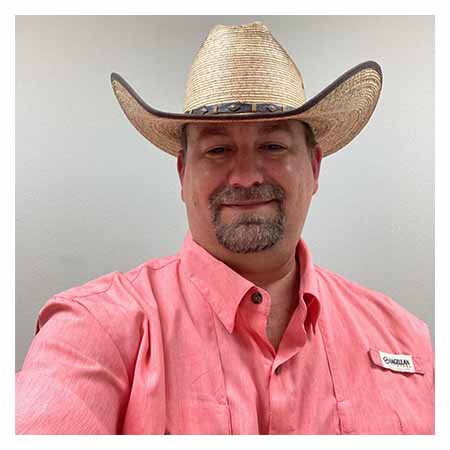A Patient Participates in a Clinical Trial of New Biologics for Chronic Rhinosinusitis with Nasal Polyps and Asthma
 When a CT scan revealed that chronic nasal polyps were causing Jeremy Pospech’s ethmoid sinus bone to thin, his ENT in Victoria, Texas, referred him to Amber Luong, MD, PhD, professor and vice chair for academic affairs in the Department of Otorhinolaryngology at McGovern Medical School at UTHealth Houston.
When a CT scan revealed that chronic nasal polyps were causing Jeremy Pospech’s ethmoid sinus bone to thin, his ENT in Victoria, Texas, referred him to Amber Luong, MD, PhD, professor and vice chair for academic affairs in the Department of Otorhinolaryngology at McGovern Medical School at UTHealth Houston.
“Dr. Luong was great – easy to talk to, down to earth, and very responsive in all our communications via the MyUTHealth Houston patient portal,” says Pospech, who is 46. “During our initial appointment, she talked options, and after five-plus years of dealing with this, I wanted surgery. But I was newly divorced, starting life over, and didn’t have the resources. She also told me I might be eligible for a clinical trial of two innovative new biologics. When the surgery fell through, I messaged her and told her I wanted to participate in the trial. She responded very quickly that she thought I would be a good candidate and, low and behold, I was accepted into the study.”
Pospech had lost the ability to smell and taste, and he also had trouble breathing, which led to snoring and fatigue. “It’s embarrassing when you sound plugged up and can’t breathe or talk normally,” he says.
The study he enrolled in is a randomized, double-blind, head-to-head comparison of dupilumab versus omalizumab in patients with severe chronic rhinosinusitis with nasal polyps and asthma. More detail about the trial, Evaluating Treatment Responses of Dupilumab versus Omalizumab in Type 2 Patients (EVEREST), is available at https://clinicaltrials.gov/ct2/show/NCT04998604.
“EVEREST is the only head-to-head trial of two biologics that are FDA- approved for patients with chronic rhinosinusitis with nasal polyps and asthma,” Dr. Luong says. “It’s ideal for patients with these two conditions who have had surgery, have worsening symptoms and recurrent nasal polyps, and are trying to avoid another surgery.”
After acceptance into the clinical trial, Pospech made the two-hour drive to Houston every two weeks for an injection of one of the two biologics. Neither he nor Dr. Luong knew which agent he was randomized to receive. Once a month, he had an in-office nasal endoscopy, smell test, and saline irrigations. He also used a nasal steroid spray daily during the trial period.
“It definitely improved the quality of my life, and I couldn’t have asked for a better research team,” he says. “Unfortunately, after I stopped the injections, I began to lose the ability to taste and breathe and suffered the same old symptoms.”
Dr. Luong is the site principal investigator of this trial and two others underway in collaboration with Memorial Hermann-Texas Medical Center for patients with either allergic fungal rhinosinusitis or chronic rhinosinusitis. “Our translational research arm complements the basic science research we’ve been doing for a few years with trials of the effectiveness of specific treatments for patients,” she says. “We now offer the entire spectrum of research from the lab to the patient.”